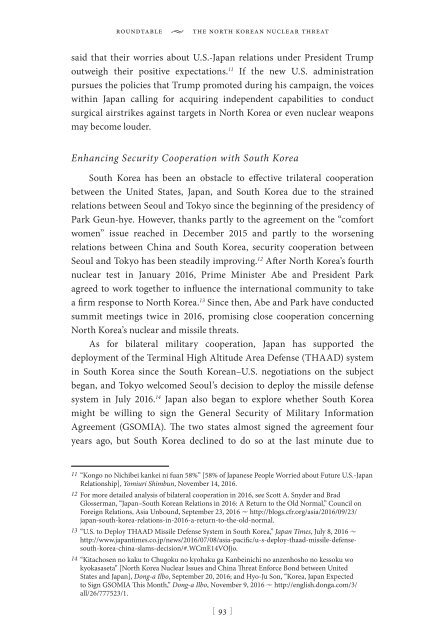2jBVKVf
2jBVKVf
2jBVKVf
Create successful ePaper yourself
Turn your PDF publications into a flip-book with our unique Google optimized e-Paper software.
oundtable • the north korean nuclear threat<br />
said that their worries about U.S.-Japan relations under President Trump<br />
outweigh their positive expectations. 11 If the new U.S. administration<br />
pursues the policies that Trump promoted during his campaign, the voices<br />
within Japan calling for acquiring independent capabilities to conduct<br />
surgical airstrikes against targets in North Korea or even nuclear weapons<br />
may become louder.<br />
Enhancing Security Cooperation with South Korea<br />
South Korea has been an obstacle to effective trilateral cooperation<br />
between the United States, Japan, and South Korea due to the strained<br />
relations between Seoul and Tokyo since the beginning of the presidency of<br />
Park Geun-hye. However, thanks partly to the agreement on the “comfort<br />
women” issue reached in December 2015 and partly to the worsening<br />
relations between China and South Korea, security cooperation between<br />
Seoul and Tokyo has been steadily improving. 12 After North Korea’s fourth<br />
nuclear test in January 2016, Prime Minister Abe and President Park<br />
agreed to work together to influence the international community to take<br />
a firm response to North Korea. 13 Since then, Abe and Park have conducted<br />
summit meetings twice in 2016, promising close cooperation concerning<br />
North Korea’s nuclear and missile threats.<br />
As for bilateral military cooperation, Japan has supported the<br />
deployment of the Terminal High Altitude Area Defense (THAAD) system<br />
in South Korea since the South Korean–U.S. negotiations on the subject<br />
began, and Tokyo welcomed Seoul’s decision to deploy the missile defense<br />
system in July 2016. 14 Japan also began to explore whether South Korea<br />
might be willing to sign the General Security of Military Information<br />
Agreement (GSOMIA). The two states almost signed the agreement four<br />
years ago, but South Korea declined to do so at the last minute due to<br />
11 “Kongo no Nichibei kankei ni fuan 58%” [58% of Japanese People Worried about Future U.S.-Japan<br />
Relationship], Yomiuri Shimbun, November 14, 2016.<br />
12 For more detailed analysis of bilateral cooperation in 2016, see Scott A. Snyder and Brad<br />
Glosserman, “Japan–South Korean Relations in 2016: A Return to the Old Normal,” Council on<br />
Foreign Relations, Asia Unbound, September 23, 2016 u http://blogs.cfr.org/asia/2016/09/23/<br />
japan-south-korea-relations-in-2016-a-return-to-the-old-normal.<br />
13 “U.S. to Deploy THAAD Missile Defense System in South Korea,” Japan Times, July 8, 2016 u<br />
http://www.japantimes.co.jp/news/2016/07/08/asia-pacific/u-s-deploy-thaad-missile-defensesouth-korea-china-slams-decision/#.WCmE14VOJjo.<br />
14 “Kitachosen no kaku to Chugoku no kyohaku ga Kanbeinichi no anzenhosho no kessoku wo<br />
kyokasaseta” [North Korea Nuclear Issues and China Threat Enforce Bond between United<br />
States and Japan], Dong-a Ilbo, September 20, 2016; and Hyo-Ju Son, “Korea, Japan Expected<br />
to Sign GSOMIA This Month,” Dong-a Ilbo, November 9, 2016 u http://english.donga.com/3/<br />
all/26/777523/1.<br />
[ 93 ]


